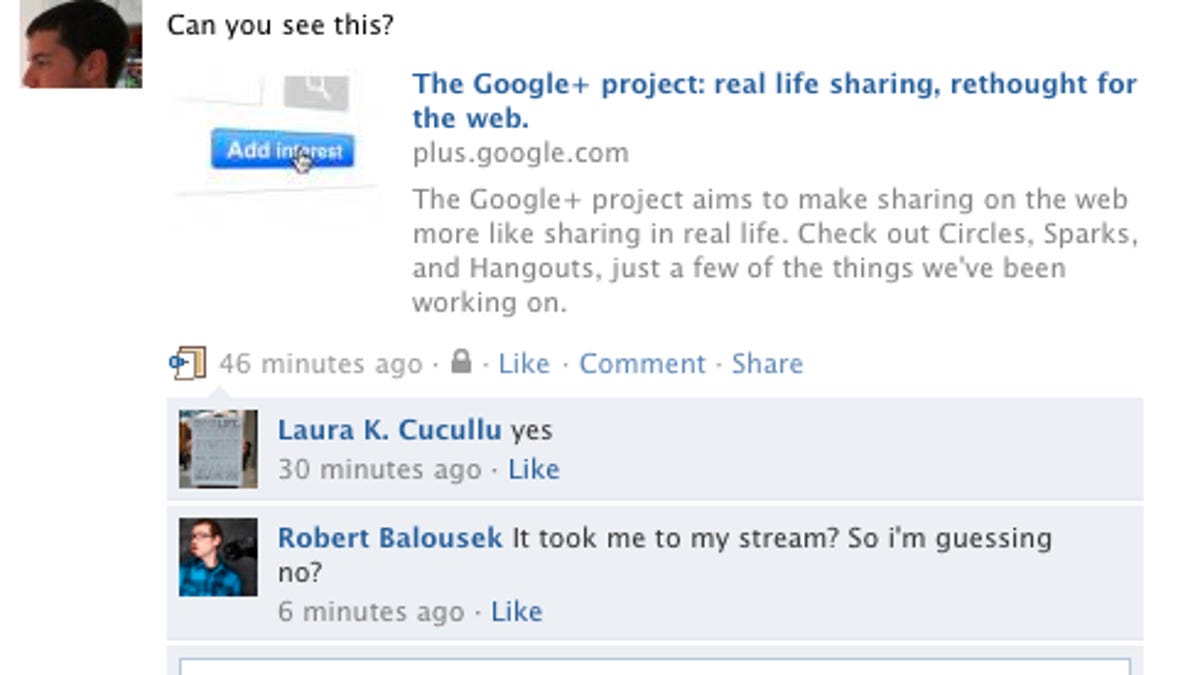Google, Facebook spar over Google+ invite issue
A purported issue that had Google+ invites not showing up on Facebook users' news feeds has sparked some subtle suggesting by Google executives that Facebook's trying to muzzle the growth of its new social network.
A purported mishandling of Google+ invitation links that keeps them from surfacing on Facebook user news feeds has resulted in a "he said, she said" match between the two companies.
A video that was posted earlier today on YouTube by a Google employee depicts an unusual behavior, with Google+ invite links that have been shared with Facebook friends not showing up in the news feeds of other users, despite appearing to do so once posted.
That video was linked to by Vic Gundotra, the senior vice president of social business for Google, in a Google+ posting earlier today, with the note that the company was "getting reports" of the behavior. "I wonder how widespread this problem is?" Gundotra asked.
The problem, in this case, is that the link urges users to come try out Google's flashy new social network, which competes directly with Facebook, leading to speculation that Facebook would somehow be hiding these links intentionally. Speculation on the other side suggests that the complaint is part of a Google gimmick to have users mistrust Facebook while giving Google+ some free marketing.
CNET attempted to re-create the behavior on multiple accounts at different times of day, including right after the video was first posted by Gundotra, as well as later on in the afternoon. As it turns out, we had a hard time re-creating the problem ourselves. Every time we tried, we saw the invite links in the news feed. Users on Google+ threads by both Gundotra and Google's Bradley Horowitz reported mixed results.
In a chat with The Daily Beast, Horowitz, who is Google's vice president of product management, told the outlet that Google hadn't gotten in touch with Facebook about the issue, to which Google says it was alerted by users.
"Users are curious, and they're asking us if we know about this," Horowitz told the outlet. "We're interested to find out if this is an anomaly, or if this is a consistent experience for users. It could just be a bug. It's impossible for us to know."
According to Facebook, though, there's no problem.
"We have seen the video but have been unable to replicate the experience it shows," a Facebook representative told CNET in a statement. The company also once again detailed how its display-filtering technology, which surfaces news to user feeds, has built-in safeguards to keep potential spam out (emphasis mine):
"Newsfeed is an automated system that is designed to deliver the most relevant content to you and your friends. The technology evaluates hundreds of factors, including your relationship to the poster, the type of content, the click-through rate (where appropriate), and people hiding similar posts from their feed. In real time, it decides what to display to you and what to filter for both Top News and Most Recent. It also includes systems that attempt to identify and block spam. Links have a history of the most abuse and are given the most scrutiny. As a result of all of these factors, a given link may be shown or filtered to people differently at different times."
Of course, one of the problems with bringing attention to the fact that a particular link is not working is that posting an influx of them to Facebook has the potential to shift the filtering to handle how those links are displayed. That means that if users suddenly begin posting similar links--like the one for inviting other users--it has the potential to adjust how those links are picked up and presented to others.
This is not the first time that Facebook's filtering algorithms have been criticized. Eli Pariser, the author of "The Filter Bubble," famously profiled how filtering on places like Google's search results, as well as Facebook's news feed, can have a big impact on what users see, potentially limiting the "bubble" of content a user sees on a daily basis. What is, perhaps, surprising is that some of the finger-pointing on this is coming from Google, which itself uses similar filtering technology on its own search results.
Google declined to offer an official statement on the matter.


